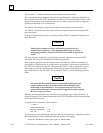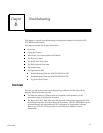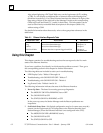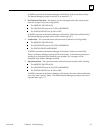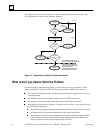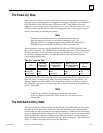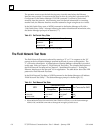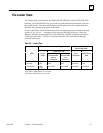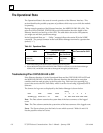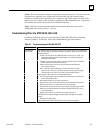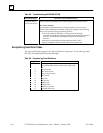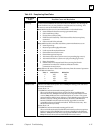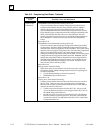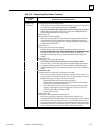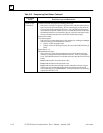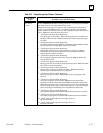
6
6-8 TCP/IP Ethernet Communications User’s Manual – January 1996
GFK-1004B
The Operational State
The Operational State is the state of normal operation of the Ethernet Interface. This
section identifies the possible symptoms of problems which may occur while the module
is operating.
During normal operation of the Ethernet Interface, the MODULE OK LED is ON. The
other two LEDs (ONLINE, STATUS OK) provide information about the health of the
Ethernet Interface and activity on the LAN. The table below shows the LED patterns
you might see and their possible meanings.
In the Operational State, no “. . . Utility” message follows the station ID in the NODE
command. The prompt character at the local Station Manager terminal is a greater-than
symbol (“>”).
Table 6-6. Operational State
LED
Connected to LAN
Not Connected to LAN
LED
Operating w/o
Exceptions
An Exception
has Occurred
Not Connected to LAN
MODULE OK ON ON ON
ONLINE ON/Blink
1
ON/Blink
1
OFF
STATUS OK ON OFF
2
OFF
2
1. ONLINE blinking indicates this node is sending or receiving data.
2. When MODULE OK is ON and STATUS OK is OFF, it is necessary to use the Station Manager
NODE, LOG, and SOSW commands to distinguish among the possible causes.
Troubleshooting When STATUS OK LED is OFF
If the Ethernet Interface is in the Operational State and the STATUS OK LED is OFF and
the MODULE OK LED is ON, then the Ethernet Interface has detected an exception
condition and has made an entry in the Exception Log. Each new (not repeating) log
event is also sent to the PLC Fault Table, where it can be viewed using Logicmaster 90-70
Software.
The format of a log event as displayed by the Station Manager is shown below:
Entry
Date Time Event Count 1 2 3 4 5 6
dd-mmm-yyyy hh:mm:ss.s xx xxxx xx xxxx xxxx xxxx xxxx xxxx
Date - The Date column contains the system date of the last occurrence of the logged
event.
Time - The Time column contains the system time of the last occurrence of the logged event.
Event - The Event column gives the kind of event which occurred. Table 6-9 and 6-10
lists the possible values for events.



